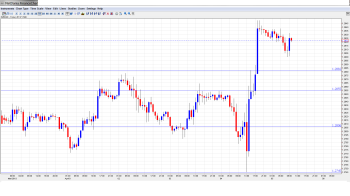EUR/USD was extremely volatile on Thursday, following the ECB rate announcement and remarks by ECB head Mario Draghi. The euro initially dropped about one cent, but then rebounded strongly to post gains on the day, as the pair closed above the 1.29 level. The ECB maintained interest rates at a record low of 0.75%. In the US, Unemployment Claims were a big disappointment, hitting their highest level since November 2012. In the Eurozone, the markets will be keeping an eye on Eurozone Retail Sales and German Factory Orders. The focus will then shift to the US, which releases three key events today – Non-Farm Employment Change, the Unemployment Rate and Trade Balance.
Here is a quick update on the technical situation, indicators, and market sentiment that moves euro/dollar.
EUR/USD Technical
- Asian session: Euro/dollar was steady, touching a high of 1.2937 and consolidating at 1.2925. The pair is unchanged in the European session.
- Current range: 1.2880 to 1.2960
Further levels in both directions:
- Below: 1.2880, 1.2805, 1.2746, 1.27, 1.2660 and 1.2587.
- Above: 1.2960, 1.3000, 1.3100, 1.3130 and 1.3170.
- 1.2880 is providing support.
- 1.2960 is the next resistance line. The round number of 1.30 is stronger.
Euro steady above 1.29 after volatile Thursday session- click on the graph to enlarge.
EUR/USD Fundamentals
- 9:00 Eurozone Retail Sales. Exp. -0.3%.
- 9:00 Eurozone Final GDP. Exp. -0.6%.
- 10:00 German Factory Orders. Exp. 1.2%.
- 12:30 US Non-Farm Employment Change. Exp. 198K.
- 12:30 US Unemployment Rate. Exp. 7.7%.
- 12:30 US Trade Balance. Exp. -44.8B.
- 12:30 US Average Hourly Earnings. Exp. 0.2%.
- 19:00 US Consumer Credit. Exp. 15.5B.
For more events and lines, see the Euro to dollar forecast
EUR/USD Sentiment
- Euro tumbles, then recovers after ECB: The euro went on a wild ride on Thursday, following the ECB policy meeting. As expected, the ECB held the benchmark interest rate at 0.75%. As in the case of recent policy meetings, the market-moving event was the follow-up press conference with Mario Draghi. The ECB head hinted at a rate cut in May or June, and this sent the euro plunging to a daily low of 1.2747. Draghi did not offer his usual optimistic view that the Eurozone economy would recover in the latter half of 2013. This time, he was much more cautious, stating that the ECB was “monitoring very closely” the deterioration in the economy. Draghi did reassure the markets that the Cyprus bailout was a unique situation, and that taxing depositors would not become normal procedure. The markets gave Draghi a thumbs up, as the euro shot higher, touching a high of 1.2947 and closing the action-packed trading day at 1.2926.
- Cyprus deposits face huge hit: The bailout agreement may have been signed between Cyprus and its international creditors, but the drama and uncertainty surrounding the rescue package continue. Strict capital controls remain in place in Cyprus, as the government remains fearful of a run on the banks. Over the weekend, authorities revealed the plan for taxing around 60% of the money on big accounts (above 100K) in the Bank of Cyprus. This steep tax is expected to have a strong negative impact on the country’s business sector, and the government has admitted that the country is in recession. In order to help the slumping economy, Cyprus plans to lift a ban on casinos and provide tax exemptions on business profits that are reinvested on the island. President Nicos Anastasiades has acknowledged that the bailout agreement is painful for Cypriots, but said that failure to reach a deal would have resulted in the collapse of the banking sector and could have led to an exit from the Eurozone. Meanwhile, Cyprus finance minister Michael Sarris has resigned. Sarris said he had done so in order to facilitate a formal investigation, which will examine the events leading up to the 10 billion euro bailout.
- Eurozone PMIs falter: There has been talk of the Eurozone economy improving sometime in 2013, but so far this year, the economy has not shown much in the way of a recovery. This has been underscored by disappointing data this week. PMI numbers out of Spain, Italy and the Eurozone point to continuing contraction in the services and manufacturing sectors, with consistent readings below the 50-point level. Meanwhile, the employment situation on the continent is a disaster, as the Unemployment Rate in the Eurozone edged up to a record high of 12.0%. The euro will likely lose more ground if the markets don’t see better numbers out of the Eurozone.
- Italian political impasse continues: After coalition talks failed, the Italian president reportedly considered resigning in order to accelerate the path to fresh elections. However, and perhaps due to pressure from ECB president Mario Draghi, President Napolitano instead appointed a panel of 10 experts, including politicians and a member of the country’s central bank, in order to try and find another political solution. The Italian media has playfully dubbed the panel the “Ten Wise Men”. All humor aside, these “wise men” will have their hands full trying to untie the Gordian knot of the inconclusive election results, which has left the Eurozone’s third largest economy in a deep political crisis. Also Italy’s small neighbor, Slovenia, has some issues. Here is some background about Slovenia.
- US data points downward: Last week saw a host of dismal US releases, as manufacturing, housing, consumer confidence and employment figures were all weak. The month of April has not brought any relief, as PMI numbers and the ADP Non-Farm Payrolls fell way below expectations. On Thursday, Unemployment Claims brought no relief. Claims were up sharply to 385 thousand, well above the estimate of 352 thousand. The markets will be hoping that Friday’s key releases will bring some cheer to what has been another dismal week. Further poor numbers are likely to raise red flags about the health of the US economy.

